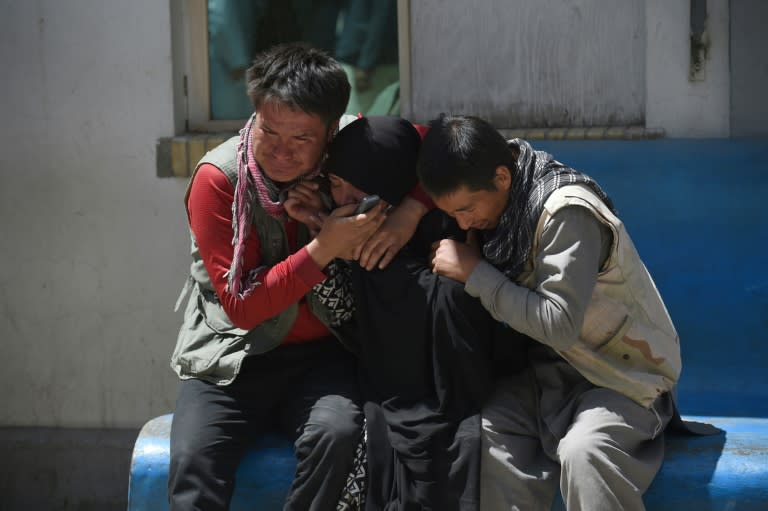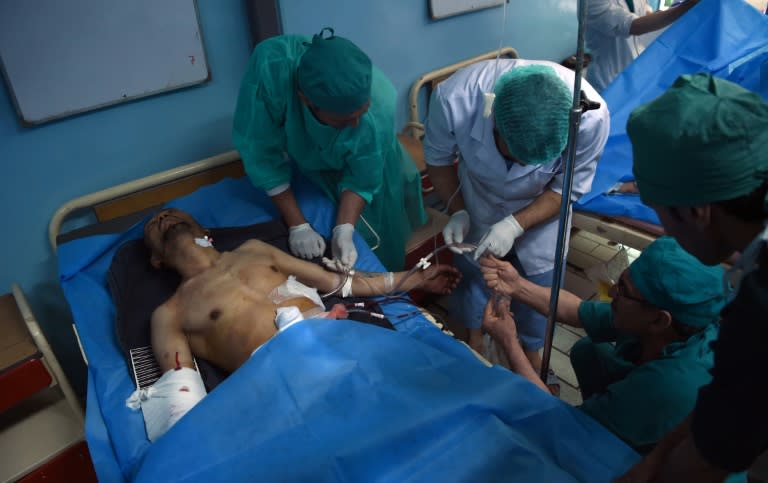Grief turns to anger over Kabul suicide attack
Hundreds of grieving Afghans buried their loved ones in Kabul on Monday amid growing anger over a suicide attack on a voter registration centre that killed 57 people including children and wounded over 100. The bomber blew himself up on Sunday morning in a large crowd queueing to collect national ID certificates so they could register to vote in long-delayed legislative elections scheduled for October. The blast, which was claimed by the Islamic State group, caused carnage in the street in the heavily Shiite-populated western neighbourhood. Pools of blood and body parts mixed with shattered glass, bloodstained ID documents and passport-sized photos on the ground. More than 40 of the wounded, including children, were taken to a trauma hospital run by Italian NGO Emergency, which said at least 20 people required "major surgeries". Most of the victims were civilians. Two police were also killed and five were wounded, Kabul police said in a statement. Anguish quickly turned to anger on social media as Afghans blamed the Kabul government for failing to protect its people -- a constant refrain after such attacks. Social networks are considered the safest way for Afghans to express their anger as street protests in the past have been targeted by militants. "They (the government) arrests them and then releases them to kill innocent people," Ahmad Ahmadi wrote on Facebook. A Facebook user called Aminullah posted: "This government is intentionally creating chaos to continue their term illegally. The only way forward is to vote and get rid of this corrupt government." Another wrote: "We don't know what the solution is; they keep killing people. Are you guys still going to vote? We voted last time to be killed now." Funerals for some of the victims began hours after the attack on Sunday and more people were buried on Monday. At one of the city's largest Shiite cemeteries, hundreds of mourners accompanying half a dozen coffins entered the grounds on Monday morning. Around 10 freshly dug graves could be seen. The attack was the latest in a series of assaults on voter registration centres across the country, fuelling concern over the impact on turnout in the upcoming parliamentary and district council elections. Election centres in the central province of Ghor and the northwestern province of Badghis have been attacked since voter registration began on April 14. - Election work continues - Over the next two months, authorities hope to register up to 14 million adults at more than 7,000 polling centres for the parliamentary and district council elections. Officials have been pushing people to register amid fears a low turnout will undermine the credibility of the polls, which are seen as a test run for next year's presidential vote. Independent Election Commission (IEC) spokesman Shafi Jalali said Sunday's attack would not interrupt preparations. "We hold meetings with security forces almost every day and they have assured us that they will provide security for all voter registration centres," Jalali told AFP. "The process has not been interrupted and it will continue." But IEC member Mohazullah Daulati acknowledged that officials were concerned about security and low voter turnout. "We hope the security forces prevent such terrorist attacks in future so that people can register to vote in a peaceful environment," Daulati told a meeting broadcast by Ariana TV. This latest suicide attack in Kabul underscores the growing challenge facing Afghan and foreign forces to protect the already heavily militarised city. General John Nicholson, who leads US and NATO forces in Afghanistan, said previously that protecting Kabul was a priority for foreign troops. But he acknowledged that preventing attacks would be challenging in the sprawling city that is poorly mapped and extremely porous. Violence also erupted in the northwestern province of Badghis on Sunday night when militants attacked an army base, killing nine soldiers. Deputy police chief Ghulam Sarwar blamed the Taliban for the ambush.



